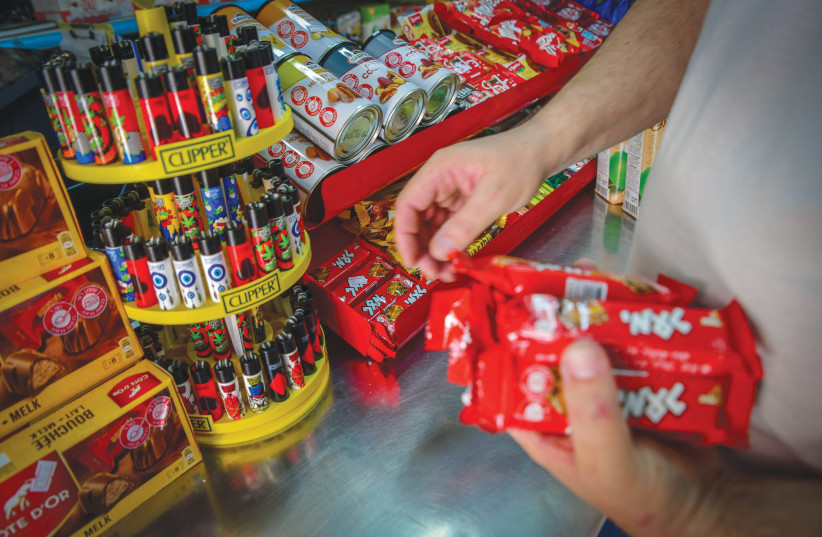Strauss Group’s Elite is the king of Israeli chocolate. From the iconic red and white “para” milk chocolate bar to a diverse range of higher-end delicacies, there is nothing more quintessentally Israeli.
However, chocolate lovers and the monopolistic food manufacturer Strauss Group collectively trembled late last month when the behemoth company issued a recall on nearly all of its chocolate-based products, after several reports of consumers getting salmonella from its confections.
Following a routine check of the company’s Elite chocolate factory production line, the discovery of multiple salmonella samples led Strauss to opt for the metaphorical nuclear option, removing thousands upon thousands of chocolate bars, cereal bars, cakes and puddings from shelves throughout Israel.
Shortly thereafter, a shocking investigation by the Health Ministry led to the discovery that the Elite factory was in violation of several health guidelines, most notably the age-old guideline that you probably shouldn’t have loose pigeons flying around in a food manufacturing facility.
In a press release following the debacle, Strauss chairwoman Ofra Strauss offered an apology: “[I’m] here to say on behalf of the company as clearly as possible: I apologize that we disappointed you,” she said. Several bedridden children with salmonella smiled – their disappointment had evaporated (though their salmonella hadn’t gone anywhere).

As a result of the reports’ findings, the ministry has suspended the factory’s manufacturing license for three months, and it will be restored only when the issues noted in the investigation have been corrected to meet the approved standard.
Strauss will surely have cleaned up its act (and bird droppings) by the end of those three months; the company has enjoyed a lion’s share of the chocolate market in Israel for years, and is doubtless already working as quickly as possible to resolve the ministry’s concerns.
That process may prove more difficult than expected, especially because only four days after the ministry report, a fire broke out in the shuttered factory. With so many accidents piling up in their lap, suspicions that a Mr. Bean-type character had bumbled his way into Strauss Group’s HQ would not be misplaced; if that is indeed the case, it had better find him and send him packing quickly, before its stock price deflates like a sad balloon.
Since the initial recall on April 25, the company’s stock price on the Tel Aviv Stock Exchange has noticeably receded, moving from NIS 9,550 (where the stock has hovered for the past month) to a low of NIS 8,813 on May 2, representing a 7.72% decline, from which it has barely recovered (at time of writing, the current price is NIS 8,850).
That’s not a catastrophic failure, but it still represents a loss of about half a billion shekels – which could mean that the majority holders, the Strauss family (Adi, Irit and the ever-sympathetic Ofra) may have to skimp on their next trip to the gold-leaf salad bar, at least until the company bounces back.
“[Strauss Group] has had a string of bad luck. Overall though, it’s a good, solid company with strong fundamentals,” said veteran market analyst Ilan Tenenbaum. “We need to give the market time to do its thing, but from a long-term perspective, it seems to me like there’s no reason to worry.”
Successful though it may be, its practices have opened the company to criticism from experts such as Dr. Alexander Coman, from the Faculty of Management at Tel Aviv University.
He noted that one of the aspects mentioned in the ministry’s report – the lack of a food safety manager – was indicative of some major oversight.
“It became clear, once they reported that they couldn’t tell whether or not the chocolate being supplied to them had gone through quality control,” he said. “You can do your own quality control, if you don’t trust your supplier. You can forgo your own quality control, if you do trust your supplier. But if you can’t say whether any quality control was done at all, that means that your processes are reckless.”
The war is on
Coman explained that despite its carelessness, Strauss has had a very tight grip on the chocolate market until now, and that isn’t going to be easy to change. “Elite is really a formidable player in many categories, particularly chocolate. Its market share is formidable, almost 70%.”
He noted that Strauss Group has not been afraid to throw its weight around in the chocolate arena. In 2014, rival Israeli chocolate producer Carmit launched an ill-fated business initiative to bring Cadbury into Israel. “Strauss blocked them from stores; as a result, that effort failed.” (In a twist of fate, Carmit’s stock price has risen over 18% since the Elite recall – the cold dish of revenge is chocolate-based after all.)
Now that store shelves are finally open, there may be a revolution on the horizon as competing brands fill the sweet and sugary vacuum created by Strauss’s absence. As well, there is a third group of chocolate hawkers in the mix: supermarkets themselves. Some supermarket chains, such as Rami Levy, have seen fit to line their shelves with their own private-label “generic brand” chocolate.

The goal of all of these players is to generate as much consumer trust and reliance as possible while Strauss is out of commission.
“The best strategy is to give quantity discounts,” said Coman. “The idea is that you give incentive to retailers to stock large quantities of your product. When Strauss goes back into production, those retailers might want to introduce Strauss again, but their shelves and warehouses are filled with your product.”
These companies won’t have much time to stake their claim, though; and once they have, they’d better hold on tight. Strauss will undoubtedly spend some of its time-out strategizing the strongest comeback possible.
“They would arm themselves with tons of PR experts, going on a massive offensive to convince the public to go back to their product, which people know and love,” said Coman. “They would give massive incentives to the retailers, such as discounts on dairy products or other products, to gain back the shelves that they lost in battle.”
Even by making all of the right moves, Strauss may struggle to fully recover.
“I doubt whether they will go back to the nearly 70% market share that they had before the crisis, but I believe that they are quite powerful and sophisticated and cunning,” said Coman.
A moment to reflect
At the dawn of Strauss’s three-month suspension, Israeli chocolate lovers are forced to look within and determine their new path forward.
“I don’t think people are going to hold out and not have chocolate for three months; people are gonna need to look for alternatives,” said a chocolate connoisseur who wished not to be named.
She confessed that she rarely opts for Elite, due to its oversweet profile. “Honestly, I use it to make hot chocolate, but if I’m snacking, I do Lindt or Toblerone.”
She opined that, given the unique circumstances, the time may be right for consumers around the country to broaden their horizons. “They definitely should [try other brands and products]. I certainly see it as an opportunity; I don’t know how many are going to take it. But, you know, theoretically, opportunity is always there.”
“Milka is the obvious first choice for me, if I’m looking for a milk chocolate fix, because, price-wise, it’s similar to the regular Elite chocolate bars. Plus, it has a nice, creamy flavor,” said 18-year-old Orli, a chocolate lover from Zichron Ya’acov.
She explained that she typically buys Elite products, but isn’t torn up about the thought of seeking an alternative. “It’s good stuff, and it will be missed; but it’s not irreplaceable for the time being.”
She took a moment to eulogize Elite’s standard milk chocolate bar: “I’m a classic kind of person. I like their milk chocolate plain: no garnish, no [additional] elements.” She drew attention to her favorite aspect of that simple bar: a single uninterrupted square in the middle of the bar, four times larger than those surrounding it.
“There’s little cow squares, and then there’s one big cow square in the middle – yes, I like that. It’s legitimate to put the whole square in your mouth and let it melt over a long period of time, as opposed to doing that with several small squares, because then you’re like ‘Oh no, I’m finishing the chocolate bar too fast.’ So it plays with the conscience. It creates an illusion. And that’s beautiful.”
Will the illustrious big cow square be enough to pave Strauss’s path back to its chocolaty throne? Perhaps, but it could find its former seat occupied by an equally cunning rival. The chocolate wars may have only just begun.
